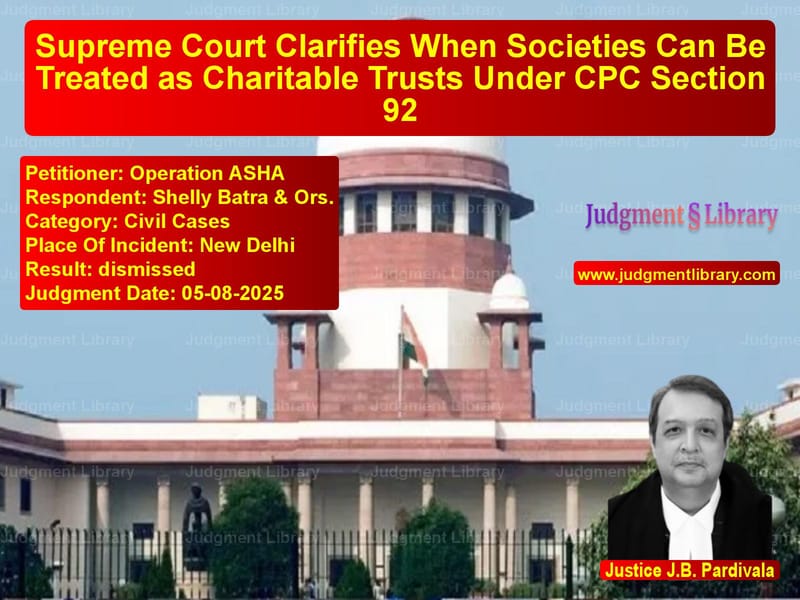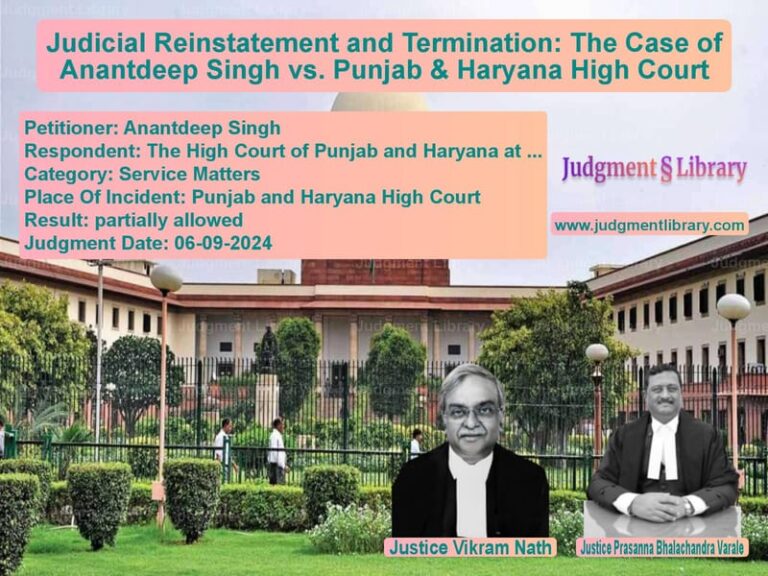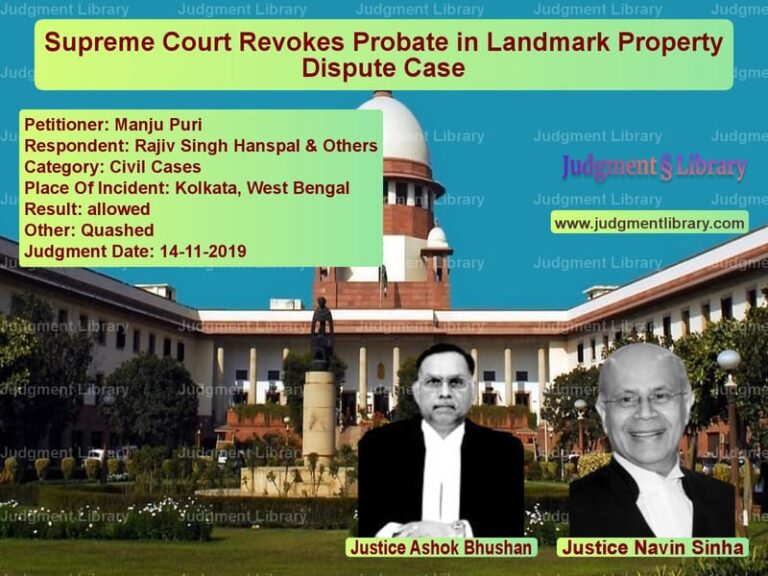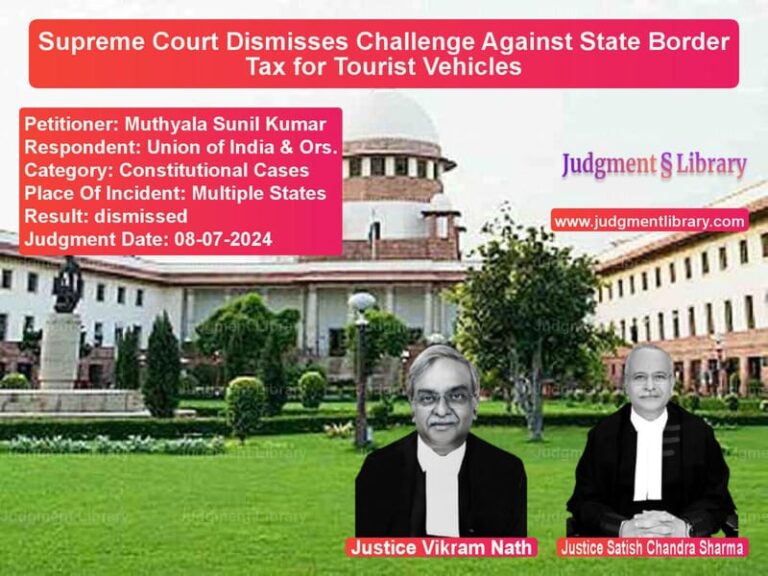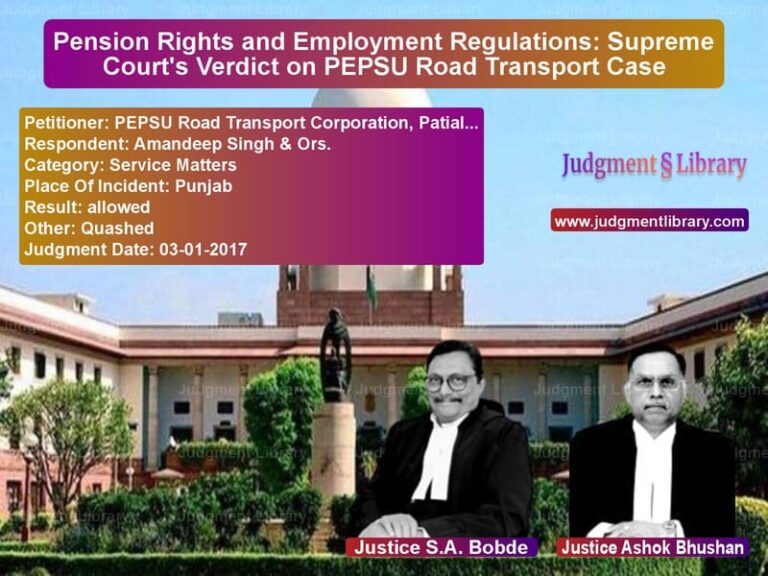Supreme Court Clarifies When Societies Can Be Treated as Charitable Trusts Under CPC Section 92
The Supreme Court of India recently delivered a significant judgment that clarifies when a society registered under the Societies Registration Act, 1860 can be considered a public charitable trust for the purpose of filing suits under Section 92 of the Code of Civil Procedure (CPC). The case involved Operation ASHA, a non-profit society providing healthcare services to underprivileged communities, particularly tuberculosis patients.
The legal battle began when Dr. Shelly Batra, a co-founder of Operation ASHA, was terminated from her position as President and removed from the Board in June 2020. Along with her mother, Usha Gupta, who remained a Board member, Dr. Batra filed a suit under Section 92 CPC alleging financial impropriety, mismanagement, and siphoning of funds by other Board members, particularly Sandeep Ahuja and Suniti Ahuja.
The core legal question before the Supreme Court was whether a society registered under the Societies Registration Act could be subjected to a suit under Section 92 CPC, which specifically deals with public charities and requires certain conditions to be met.
The Legal Framework of Section 92 CPC
Section 92 of the CPC provides a special mechanism for dealing with alleged breaches of trust in public charitable or religious institutions. The provision allows the Advocate-General or two or more persons having an interest in the trust to institute a suit after obtaining leave from the court. The reliefs that can be sought include removing trustees, appointing new trustees, directing accounts and inquiries, and settling schemes for administration.
The Supreme Court elaborated on the object and purpose behind Section 92, noting that “a suit under this provision can be termed as a ‘representative suit of a special nature’ since the object behind the enactment of this provision is the protection of public rights in the public trust.” The Court emphasized that this procedural safeguard prevents public trusts from being subjected to undue harassment through frivolous suits.
Conditions for Applying Section 92 CPC
The Court reiterated the three essential conditions that must be satisfied to invoke Section 92 CPC, as established in the precedent of Ashok Kumar Gupta vs. Sitalaxmi Sahuwala Medical Trust: “(i) the Trust in question is created for public purposes of a charitable or religious nature; (ii) there is a breach of trust or a direction of court is necessary in the administration of such a Trust; and (iii) the relief claimed is one or other of the reliefs as enumerated in the said section.”
There was no dispute that Operation ASHA served public charitable purposes through its healthcare initiatives. The contentious issue was whether the society could be considered a ‘trust’ or ‘constructive trust’ for the purpose of Section 92.
Can a Society Be Considered a Trust?
The appellant society argued that it was merely a registered society, not a trust, and therefore Section 92 CPC did not apply. They contended that “the governing body members of the society shall only become ‘trustees’ if a trust is created for the purpose of managing the assets of the society.” They relied on various High Court decisions to support their position that a suit under Section 92 would not be maintainable against a registered society.
The respondents, however, argued that the society functioned as a constructive trust because it held property for charitable work. They pointed to the Memorandum of Association which stipulated that all income and properties “shall be solely utilized and applied towards the promotion of its aims and objectives” and that no profits would be distributed to members. They also highlighted Article 11.2.1 of the Articles of Association which stated that “All the properties, movable, immovable and other kind of assets shall stand vested in the Committee.”
The Doctrine of Constructive Trust
The Supreme Court engaged in an extensive analysis of the doctrine of constructive trust, examining both English and American jurisprudence. The Court explained that while an express trust is created by the intention of the parties, “a constructive trust arises by operation of law, without regard to or irrespective of the intention of the parties to create a trust.”
The Court noted that “a constructive trust is imposed predominantly because the person(s) holding the title to the property would profit by a wrong or would be unjustly enriched if they were permitted to keep the property.” Quoting American jurisprudence, the Court observed that “a constructive trust is a formula through which the conscience of equity finds expression. When property has been acquired in such circumstances that the holder of legal title may not in good conscience retain the beneficial interest, equity converts him into a trustee.”
Application to the Present Case
The Supreme Court found that the governing body of Operation ASHA held properties in a fiduciary capacity, bound by duties to use them exclusively for the society’s charitable objectives. The Court held that “any conduct by the fiduciary which deprived the intended beneficiaries of their beneficial interest in the property, in such a manner that is in contravention to the covenants that bind him and confers an advantage to him to the detriment of the intended beneficiaries” could give rise to a constructive trust.
The Court emphasized that “the moment the fiduciary receives money which he cannot conscientiously retain for himself, a constructive trust would be raised in favour of the beneficiaries on whose account the money was originally received.” The allegations of fund siphoning, if proven, would establish both the existence of a constructive trust and its breach.
Breach of Trust and Need for Court Directions
The Court examined whether the suit satisfied the second condition of Section 92 – either a breach of trust or the necessity of court directions for administration. The plaintiffs had alleged serious financial irregularities, including siphoning of donations into shell companies, avoidance of statutory employee benefits, misrepresentation to donors, and coercive practices against employees.
The Court noted that “the respondent nos. 1 and 2 respectively have alleged that the respondent nos. 3 and 4 respectively, were indulging in gross financial impropriety, misconduct and siphoning off of funds/donations received by the appellant Society for personal gains.” These allegations, if proven, would constitute a breach of the constructive trust.
The Court also referenced interim reports and forensic audits that indicated problems in the society’s financial affairs and administration, supporting the need for court intervention.
Conclusion
The Supreme Court ultimately upheld the grant of leave to institute the suit under Section 92 CPC, finding that all necessary conditions were prima facie satisfied. The Court clarified that while a registered society is not automatically a trust, it can be subject to a constructive trust when its fiduciaries misuse properties intended for charitable purposes.
The judgment provides important guidance on when societies engaged in charitable work can be treated as public trusts under Section 92 CPC, ensuring accountability and proper administration of organizations serving public interests. The Court’s extensive discussion of constructive trust doctrine also enriches Indian equity jurisprudence, providing courts with principles to address situations where fiduciaries misuse their positions for personal gain.
The case will now proceed before the High Court, where the plaintiffs will have to substantiate their allegations of financial misconduct and mismanagement. If they fail to prove their claims, the suit may be dismissed, but for now, the Supreme Court has affirmed that the legal framework of Section 92 CPC can be invoked to address alleged breaches of trust in societies serving public charitable purposes.
Petitioner Name: Operation ASHA.Respondent Name: Shelly Batra & Ors..Judgment By: Justice J.B. Pardivala.Place Of Incident: New Delhi.Judgment Date: 05-08-2025.Result: dismissed.
Don’t miss out on the full details! Download the complete judgment in PDF format below and gain valuable insights instantly!
Download Judgment: operation-asha-vs-shelly-batra-&-ors.-supreme-court-of-india-judgment-dated-05-08-2025.pdf
Directly Download Judgment: Directly download this Judgment
See all petitions in Property Disputes
See all petitions in Contract Disputes
See all petitions in Consumer Rights
See all petitions in Debt Recovery
See all petitions in Education Related Cases
See all petitions in Environmental Cases
See all petitions in Reservation Cases
See all petitions in Judgment by J.B. Pardiwala
See all petitions in dismissed
See all petitions in supreme court of India judgments August 2025
See all petitions in 2025 judgments
See all posts in Civil Cases Category
See all allowed petitions in Civil Cases Category
See all Dismissed petitions in Civil Cases Category
See all partially allowed petitions in Civil Cases Category

